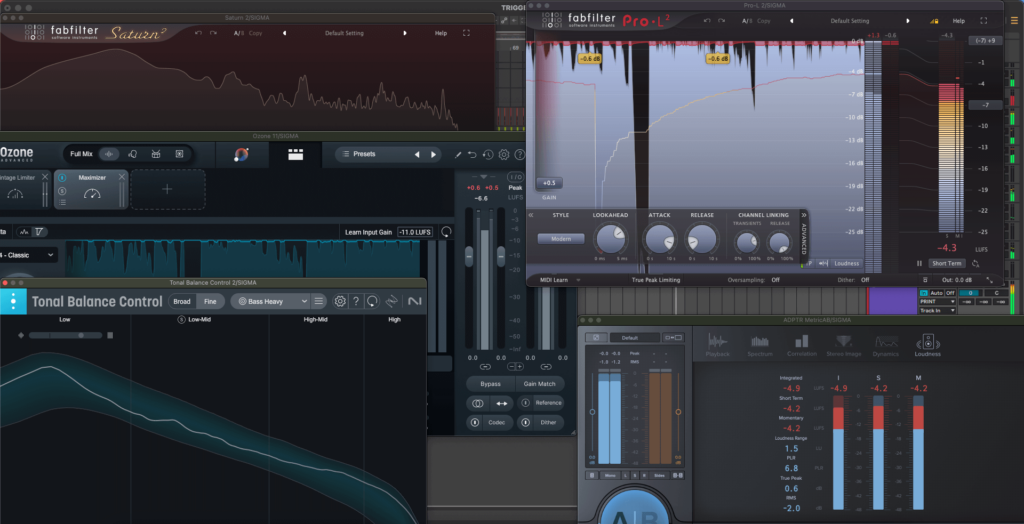Why Master a Track or Project?
Once mixing is complete, a track is not yet ready for professional release. It must go through mastering, an essential step that prepares it for streaming platforms, physical formats (CD, vinyl), and ensures it sounds great on any playback system, whether in headphones, a car, or on home speakers.
Mastering involves a series of subtle but crucial adjustments: overall dynamics, frequency balance (tonal balance), stereo consistency, phase control, and final loudness (LUFS) according to current industry standards and genre conventions. This step adds the final “polish” to make your track competitive with professional releases.
For albums or EPs, mastering provides cohesion across tracks, ensuring a consistent sonic flow and perceived volume, so listeners can enjoy a smooth, uninterrupted experience without constantly adjusting the volume.
Mastering also relies on psychoacoustic principles, considering how the human ear perceives frequencies, dynamics, and loudness. This approach optimizes the track’s emotional impact and clarity in any listening context.
Additionally, mastering ensures a track has power and presence. In an industry where top-performing tracks stand out by their sonic impact, a well-controlled yet high loudness level immediately captures the listener’s attention.
The goal is not to over-compress, but to find the perfect balance between power, clarity, and emotion. A strong, precise, and punchy master adds depth to the music and makes it competitive on streaming platforms, radio, or in clubs.
For physical formats such as CDs or vinyl, specific treatments are applied to adapt the master while preserving the project’s sonic identity.
At Cerky Studio, mastering is performed in Pro Tools or Ableton, using high-end analog and digital tools to achieve a result that is precise, powerful, and faithful to the artist’s intention.
Also read : Frequently Asked Questions about Mastering
What Makes a Good Master ?
Mastering is the final step that gives a track a professional sound, ready to compete with industry standards and be released on any platform or format.
Just like mixing, the quality of the master depends heavily on the work done during creation, arrangement, and mixing. Mastering cannot turn a poorly produced track into a hit; rather, it enhances and perfects what was carefully built from the start. Paradoxically, the less there is to fix during mastering, the better the previous stages were executed.
Mastering Objectives
The goal of mastering is to enhance the artistic intent of a track, refine its character through subtle and precise adjustments (tonal balance, dynamics, phase, loudness) to achieve a final result that is powerful, clear, and industry-standard compliant.
There are also advanced techniques, such as Stem Mastering, which allow for targeted adjustments on different sections of a mix if needed. This approach is intended to polish rather than fix.
In short, the better the mix, the more mastering can reveal the richness and quality of the track.
Also read : Mastering by music genre
A good master does not create a good song, but it transforms a good song into a track ready to make an impact on listeners.
Preparing Your Track for Mastering
Clarify your vision and expectations:
- Listen to the track beforehand and, if needed, schedule a video call with the mastering engineer to discuss goals and provide feedback.
- Decide on the best process for your project (stereo master, stem mastering, or any adjustments to be made to the mix).
Prepare and organize your mix for export:
- Avoid excessive limiting or compression on the master bus (unless intentional). Mastering needs headroom to work with dynamics.
- Keep creative effects (light saturation, global reverb…) if they are part of the desired sound.
- Export in uncompressed WAV or AIFF, 24-bit (or 32-bit float if possible), keeping the original project sample rate (44.1 kHz, 48 kHz, or higher).
- Include the rough mix to provide context for the overall vision.
- Share professional reference tracks that reflect your target sound.
- For albums or EPs, provide all tracks in the same export state to maintain consistency.
- Include the final project, track, and artist names to avoid errors during file creation.
- Specify if there are specific versions to master (radio edits, instrumentals, etc.).
Also read : Mastering Your Track at Cerky Studio
For any additional questions about mastering, consult the Mastering FAQ or contact Cerky Studio.


